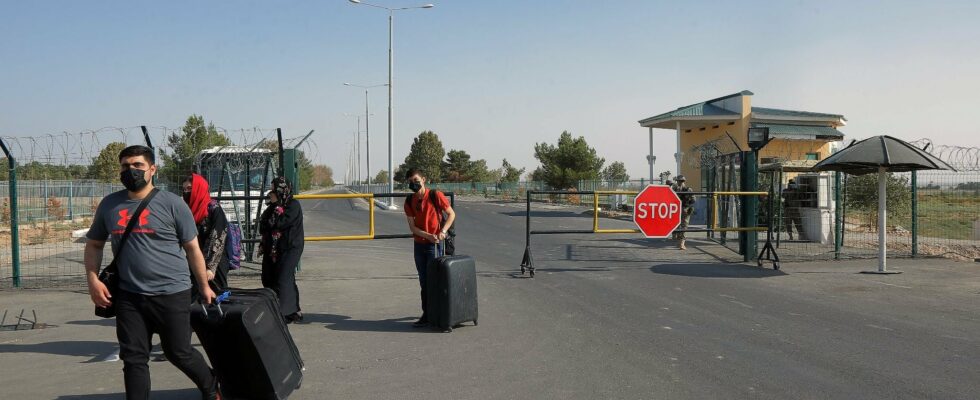A line of trucks loaded with flour waits in front of the Termez border post, at the entrance to Afghanistan. To reach the Afghan cities of Mazar-e Sharif and Kabul, then, finally, Pakistan, goods from Central Asia pass through the “friendship bridge” which connects Uzbekistan to Afghanistan, spanning the muddy waters of the Amu Darya River. Through this passage, 100 to 150 25-ton trucks pass daily. “The Afghan businessmen with whom we work are the same as before the arrival of the Taliban, in August 2021,” confides Nodirbek Djalilov, director of the Termez goods center.
But since August 29, something new has caught the eye of truckers waiting at the checkpoint: a vast free trade economic zone, Airitom, has emerged on the Uzbek-Afghan border. “This project has been in the pipeline since 2020. Then, we had to discuss with the Taliban, but it went rather well,” says Kodiz Parpiev, general director of the Airitom zone. The brand-new $70 million site is expected to accommodate nearly 300 businesses – mainly Uzbek companies – and is home to a Hilton hotel, a state-of-the-art hospital center and a luxurious restaurant serving Turkish and Uzbek specialties. All to encourage trade with Afghanistan, 500 meters away, ravaged by a deep socio-economic crisis.
Attempt at standardization
“Afghan traders who come to develop their business will benefit from subsidies,” explains Kodiz Parpiev, “and they will be authorized to stay fifteen days in this area.” Spread over 36 hectares, the future Airitom embodies the desire of the Uzbek authorities to trade with their neighbor. On August 18, Prime Minister Abdulla Oripov became the first head of government to visit Kabul. He concluded $2.5 billion worth of trade and investment treaties there. Although Tashkent does not recognize the Taliban regime, ostracized by the international community for its policy of erasing women in society, the country is one of a handful of Central Asian states seeking to normalize the Taliban.
In fact, Taliban delegations have been welcomed with honors in the region for several months. On September 11 in Islim Cheshma, Turkmenistan, Taliban diplomats celebrated with great fanfare the completion – on the Turkmen side – of work on the Tapi gas pipeline (Turkmenistan-Afghanistan-Pakistan-India) and their start-up in Afghan territory. For its part, Kyrgyzstan removed the Taliban movement from its list of “prohibited organizations” on September 5, as Kazakhstan did earlier in December, and has just accredited a new Taliban charge d’affaires to the Afghan embassy in Astana. This cordial understanding extends to Tajikistan, which last year authorized the Islamist regime to manage a consulate in Khorog, in the autonomous region of Upper Badakhshan.
For all these states, the interest in moving closer to Afghanistan is above all commercial. This country, one of the poorest on the planet, is in fact an outlet for selling their oil, gas and agricultural products. But above all, this mountainous territory is the gateway to Pakistan and its maritime ports. This is why Tashkent is actively promoting the extension to Peshawar, Pakistan, of the railway that currently connects the cities of Termez to Mazar-e-Sharif – although no concrete financing plan has yet been made. been put on the table.
“Uzbekistan is the regional actor most committed to normalizing relations with the Taliban,” explains Hamza Boltaïev, director of the Center for Afghanistan and South Asia Studies at the Institute of Advanced International Studies. , in Tashkent. It must be said that the country has a diaspora of several thousand Afghans, settled since the 1990s, who have integrated well. “More than 400 Afghan companies are present in Termez [extrême sud de l’Ouzbékistan]assures Otabek Tursunov, deputy mayor of the city. Many of them trade with Afghanistan.” Here, the two populations adapt to this coexistence. “We have always lived side by side,” confirms Moukhamad Oqsoqol, Afghan entrepreneur born in Mazar-e Charif, established in Termez for about twenty years.
Instability
The Uzbek government continues to deliver humanitarian aid to Kabul, i.e. “500 to 1,000 tonnes per day”, according to the Termez logistics terminal. On the outskirts of the city, a few hundred Afghan students, some of whom fled the arrival of the Islamist regime, study in an education center supported by the United Nations Development Program and the European Union. “Tashkent is pleading for the countries of Central Asia to have a common approach regarding Afghanistan,” explains Hamza Boltaïev. “It is using economic leverage to influence Taliban policy.” Even. Despite three years of flourishing trade, expectations are not met. Because this country remains unstable, as shown by the ultra-secure border on the outskirts of Termez, with the threat from the Islamic State group of Khorasan, based in Afghanistan, which remains significant since the attack in Moscow last March. And the terrorist organization also targets Central Asian countries.
Apart from the commercial question, any dialogue with the Islamists therefore remains fruitless: Kabul remains inflexible on women’s rights, which are violated. As for the construction by the Taliban last year of a 100 meter wide canal upstream of the Amu Darya River, it seriously penalized Uzbekistan and Turkmenistan in their water supply and dampened enthusiasm. . On one side or the other of the “bridge of friendship”, life with the Taliban neighbors is not yet a long, quiet river.
.
